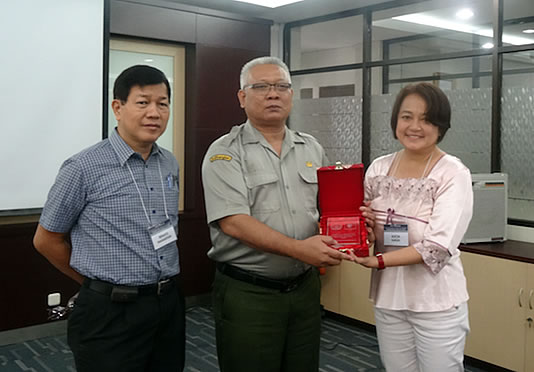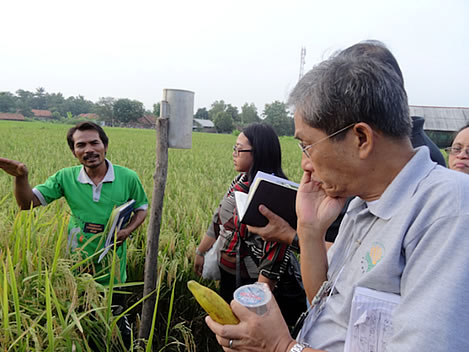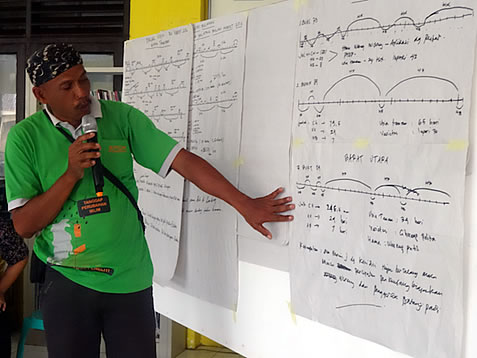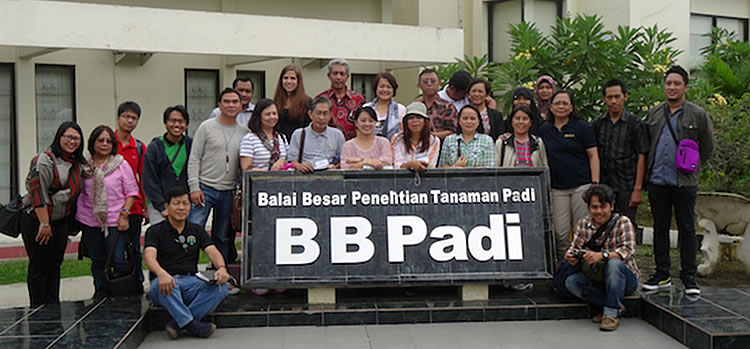 Considered to be the largest archipelagic state in the world consisting of some 17,500 islands with majority of the total population living in marginalized environments that are susceptible to weather and climate related disasters, the Indonesian government has taken several research- and technology-based climate change adaptation and mitigation measures to reduce the threats to food and nutrition security. CIAT together with its local partner, the ASEAN-German Programme on Response to Climate Change (GAP-CC) Deutsche Gesellschaft für Internationale Zusammenarbeit (GIZ) GmbH, based in Jakarta, coordinated the visits of the Study Mission to the following agencies and institutions working on CCAM under the Indonesian Ministry of Agriculture: Directorate General Food Crops Indonesia, Indonesian Agency for Agricultural Research and Development (IAARD), Indonesian Center for Agricultural Post Harvest Research and Development (ICAPOSTRD), Indonesian Soil Research Institute (ISRI), Indonesia Agro-climate and Hydrology Research Institute (IAHRI), Indonesia Center for Agriculture Land Resources Research and Development (ICALRRD) and International Center for Rice Research (ICRR).
Considered to be the largest archipelagic state in the world consisting of some 17,500 islands with majority of the total population living in marginalized environments that are susceptible to weather and climate related disasters, the Indonesian government has taken several research- and technology-based climate change adaptation and mitigation measures to reduce the threats to food and nutrition security. CIAT together with its local partner, the ASEAN-German Programme on Response to Climate Change (GAP-CC) Deutsche Gesellschaft für Internationale Zusammenarbeit (GIZ) GmbH, based in Jakarta, coordinated the visits of the Study Mission to the following agencies and institutions working on CCAM under the Indonesian Ministry of Agriculture: Directorate General Food Crops Indonesia, Indonesian Agency for Agricultural Research and Development (IAARD), Indonesian Center for Agricultural Post Harvest Research and Development (ICAPOSTRD), Indonesian Soil Research Institute (ISRI), Indonesia Agro-climate and Hydrology Research Institute (IAHRI), Indonesia Center for Agriculture Land Resources Research and Development (ICALRRD) and International Center for Rice Research (ICRR).
 In Jakarta, the group met with Dr. Hasil Sembring, Director General of Directorate General of Food Crops; Dr. Chandra Indrawanto, Deputy Director for Research Cooperation and Public Relation, IARRD; and Ms. Syamsidar Thamrin, Deputy Director for Weather and Climate of the Ministry of National Development Planning (BAPPENAS). Dr. Sembring presented the Indonesian government’s Rice Development Program for 2015-2019 which outlines the different strategies of the government to increase rice production for food security as well as to improve the livelihood of farmers who are most vulnerable to climate change. Some of these strategies include the development of 1000 seed self-sufficient villages, improvement of irrigation facilities, procurement of 100,000 units of agricultural machineries, development of 2 million hectares of marginal lands, and scaling up of best management practices in rice production.
In Jakarta, the group met with Dr. Hasil Sembring, Director General of Directorate General of Food Crops; Dr. Chandra Indrawanto, Deputy Director for Research Cooperation and Public Relation, IARRD; and Ms. Syamsidar Thamrin, Deputy Director for Weather and Climate of the Ministry of National Development Planning (BAPPENAS). Dr. Sembring presented the Indonesian government’s Rice Development Program for 2015-2019 which outlines the different strategies of the government to increase rice production for food security as well as to improve the livelihood of farmers who are most vulnerable to climate change. Some of these strategies include the development of 1000 seed self-sufficient villages, improvement of irrigation facilities, procurement of 100,000 units of agricultural machineries, development of 2 million hectares of marginal lands, and scaling up of best management practices in rice production.
In Bogor, the Study Mission Team was warmly welcomed by Dr. Ed Hussein, Director of ICALRRD. ICALRRD develops and evaluates research programs on the efficient utilization of agricultural land resources, research on remote sensing, and agricultural land resources inventory, among others. The group was given an overview of the Integrated Cropping Calendar Information System developed by IAHRI as a decision-support system tool that provides information on seasonal climate forecast cropping pattern, potential planting areas, flood or drought prone areas, pest infestation, fertilizer rate recommendations, and appropriate varieties based on climate forecast. The agency also generates Land Suitability Maps for Selected Agricultural Commodities such as oil palm, cacao, orange, and sugarcane in nine provinces and two regencies in Indonesia that serve as input to land use planning and crop suitability evaluation. The group also visited the Indonesian Center for Agricultural Technology Assessment and Development (ICATAD), which houses the demonstration farm for the government-initiated “Sustainable Food-Reserved Garden (SFRG).” The SFRG promotes the concept of home-yard garden in a village or district to strengthen food security at household levels and as an effort to reduce global warming by using household waste as planting media.
 One of the major highlights of the Study Mission was the opportunity to interact with the rice farmers in Subang and Indramayu, West Java, where the first Climate Field Schools (CFS) were piloted. The rice farmers are members of the Indramayu Rainfall Observers Club (ROC) who took part in the Science Field Shops (SFSs), an “on-field” agro-meteorological learning project between farmers, farmer-scientists, and farmer-extension workers/facilitators. Organized by anthropologists from the Center for Anthropological Studies of the Faculty of Social and Political Sciences, University of Indonesia in collaboration with the Agromet Vision-Netherlands, the SFSs is considered to be a new extension approach whereby the farmers are the active learners, carrying out their daily observations of rainfall and agro-ecosystems, documenting their findings, analyzing and discussing these findings through regular monthly meetings. Through the SFSs, the farmers said that they gained a deeper understanding of the impacts of climate change. The regular monthly meeting of the Indramayu ROC has become a venue for knowledge sharing among farmer-observers as they learn from each other’s experiences on alternative cropping and land use strategies that would help them avoid harvest failures or yield reductions. (Rosario B. Bantayan)
One of the major highlights of the Study Mission was the opportunity to interact with the rice farmers in Subang and Indramayu, West Java, where the first Climate Field Schools (CFS) were piloted. The rice farmers are members of the Indramayu Rainfall Observers Club (ROC) who took part in the Science Field Shops (SFSs), an “on-field” agro-meteorological learning project between farmers, farmer-scientists, and farmer-extension workers/facilitators. Organized by anthropologists from the Center for Anthropological Studies of the Faculty of Social and Political Sciences, University of Indonesia in collaboration with the Agromet Vision-Netherlands, the SFSs is considered to be a new extension approach whereby the farmers are the active learners, carrying out their daily observations of rainfall and agro-ecosystems, documenting their findings, analyzing and discussing these findings through regular monthly meetings. Through the SFSs, the farmers said that they gained a deeper understanding of the impacts of climate change. The regular monthly meeting of the Indramayu ROC has become a venue for knowledge sharing among farmer-observers as they learn from each other’s experiences on alternative cropping and land use strategies that would help them avoid harvest failures or yield reductions. (Rosario B. Bantayan)
